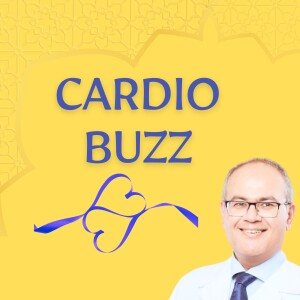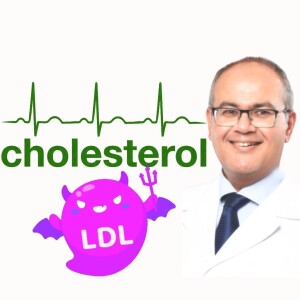Episodes

Wednesday Sep 20, 2023
Wednesday Sep 20, 2023
With #diabetes projected to affect 783 million patients globally, understanding its connection to #coronary disease, #heartfailure , and #kidneydisease is crucial. We explore the latest guidelines from the European Society of Cardiology and break down the essentials, from diabetes diagnosis to cardiovascular risk assessment, lifestyle modifications, glucose-lowering medications, and other topics.
#heart #healthcare #medicine #doctor #nurse #medical #coronavirus #covid19 #healthylifestyle #hospital #mentalhealth #dentistry #pharmacy #surgery #healthtips #weightloss #fitness #workout #diet #nutrition #exercise #wellness #selfcare #prevention #disease #treatment #research

Thursday Sep 14, 2023
Thursday Sep 14, 2023
لدينا جميعاً شعور أن حالات الموت المفاجئ ☠️ دون سابق إنذار قد زادت بين أوساط الشباب والرياضيين 🏃♂️🏃♂️
وعندما اجتاحتنا الكورونا 😷😷😷 في سنة ألفين وعشرين وزادت معها معدل الوفيات طبعا وزاد معها شعورنا بكثرة حالات الموت المفاجئ
ونسبها البعض الى الكورونا نفسها ونسبها البعض الآخر للتطعيمات أو اللقاحات واختلط في ذلك العلم.. بتأويلات مدّعي العلم وبنظريات المؤامرة
فهل هناك علاقة بين الإصابة بالكورونا والموت المفاجئ
وماذا عن اللقاحات وأثرها؟💉💉
الإجابة المباشرة والقصيرة هي نعم
هناك ارتباط بين الإصابة بالكورونا وأمراض القلب والموت المفاجئ 💔💔❤️🩹
ونعم هناك ارتباط بين لقاحات الكورونا وبعض أمراض القلب 💔
ولكن دعونا نبدأ القصة من البداية

Friday Sep 08, 2023
Friday Sep 08, 2023
في قديم الزمان ، كان البشر يعتقدون أن أقدارهم محددة في النجوم والأفلاك والكواكب ولايزال الكثير ممن أعرفهم يعتقدون أن أبراجهم الفلكية ترسم شخصياتهم وتحدد مصيرهم في الحياة
أما في الطب الحديث، وبدلاً من رسم خرائط الأبراج الفلكية ، يمكننا رسم خرائط للجينات.
وقد خريطة الجينات هذه على التنبؤ بمن سيمرض ومتى سيمرض وبأي مرض سيصاب.
ولكن أيهما أكثر تأثير على خطر الإصابة بأمراض القلب؟ جودة الجينات أم جودة العادات؟
هل يمكن إن وَرّثنا آباؤنا طفرات جينية واقية أن تحمينا من أثر العادات الصحية السيئة؟
وعلى العكس هل يمكن لنمط الحياة الصحي أن يحد من تأثير الطفرات الجينية المؤذية الموروثة؟

Sunday Sep 03, 2023
Sunday Sep 03, 2023
Welcome to ESC this year from Amsterdam, the city known of charming canals, cycling, and attractive architecture. There were 5 new guidelines, tens of session and 30 late-breaking clinical trials. In this episode, I've handpicked just seven trials. The choice was made based on the importance of the topics, the ability of the results to shake up the practice and challenge some cardiology dogmas.
Some of the trials were positive, others were negative, but we learn in both cases. I'll be presenting the trials in ascending order of importance, saving the most impactful one for last. Here we go...

Thursday Aug 31, 2023
Thursday Aug 31, 2023
هل يجب أن نتناول الأسبرين بعد سن الأربعين لمنع النوبات القلبية والسكتات الدماغية أم لا؟
هل هو مفيد أم مضر؟

Thursday Aug 31, 2023
Thursday Aug 31, 2023
تستوستيرون هو هرمون الذكورة الذي يمنح الرجال القوة والدافع والعزيمة لتحقيق الأهداف. انخفاض مستويات التستوستيرون يؤدي الى فتور الرغبة الجنسية وضعف الانتصاب والإرهاق وضعف العضلات والاكتئاب والدوار وانخفاض كثافة العظام. هل يؤثر ذلك على صحة القلب؟ ماذا يحدث إذا قمنا بتصحيح نقص التستوستيرون باستخدام التستوستيرون الخارجي؟ هل سيؤذي القلب أم يشفيه؟ ماذا تخبرنا أحدث الأبحاث عن تعويض التستوستيرون وتأثيره على القلب؟

Sunday Aug 13, 2023
Sunday Aug 13, 2023
Hypertension affects one third of humans. Untreated hypertension, shortens life expectancy by five years because it's a major cause of heart failure, renal failure, strokes, and coronary disease. The mortality due to hypertension has increased more than 30% in the last three decades. And the sad fact is that hypertension is uncontrolled in the majority of hypertensive patients, but it seems there's a breakthrough treatment.
Angiotensinogen is a protein, it's mainly produced by the liver. If we stop the production of Angiotensinogen in the liver, then the whole. Renin angiotensin system will be silenced. And we have the results of the study on DNA silencing available.

Sunday Jul 16, 2023
Sunday Jul 16, 2023
Testosterone is the primal essence of manhood. Testosterone is the gift that gives men the strength, the drive, and the resolve to achieve goals. It's part of what makes man a man.
But what happens when testosterone levels drop? Does that affect the heart's health? What happens if we correct testosterone deficiency with exogenous testosterone? Will it damage the heart or heal it? What does the latest research on testosterone replacement tell us?

Tuesday Jul 04, 2023
Tuesday Jul 04, 2023
What is the difference between cholesterol and LDL cholesterol?
What evidence do we have that link cholesterol and heart disease?
How convincing is that evidence?
Is it a myth created by the drug industry or is it a fact backed by science?
Let's answer all of these questions in this episode

Sunday Jun 18, 2023
Sunday Jun 18, 2023
I've got several questions and comments all related to the cause of atherosclerosis. Most of the questions and comments were skeptical and doubting the causal effect of cholesterol atherosclerosis. In this episode we elaborate more on how modern science arrives at conclusions on the cause of diseases, especially chronic degenerative diseases like atherosclerosis.









